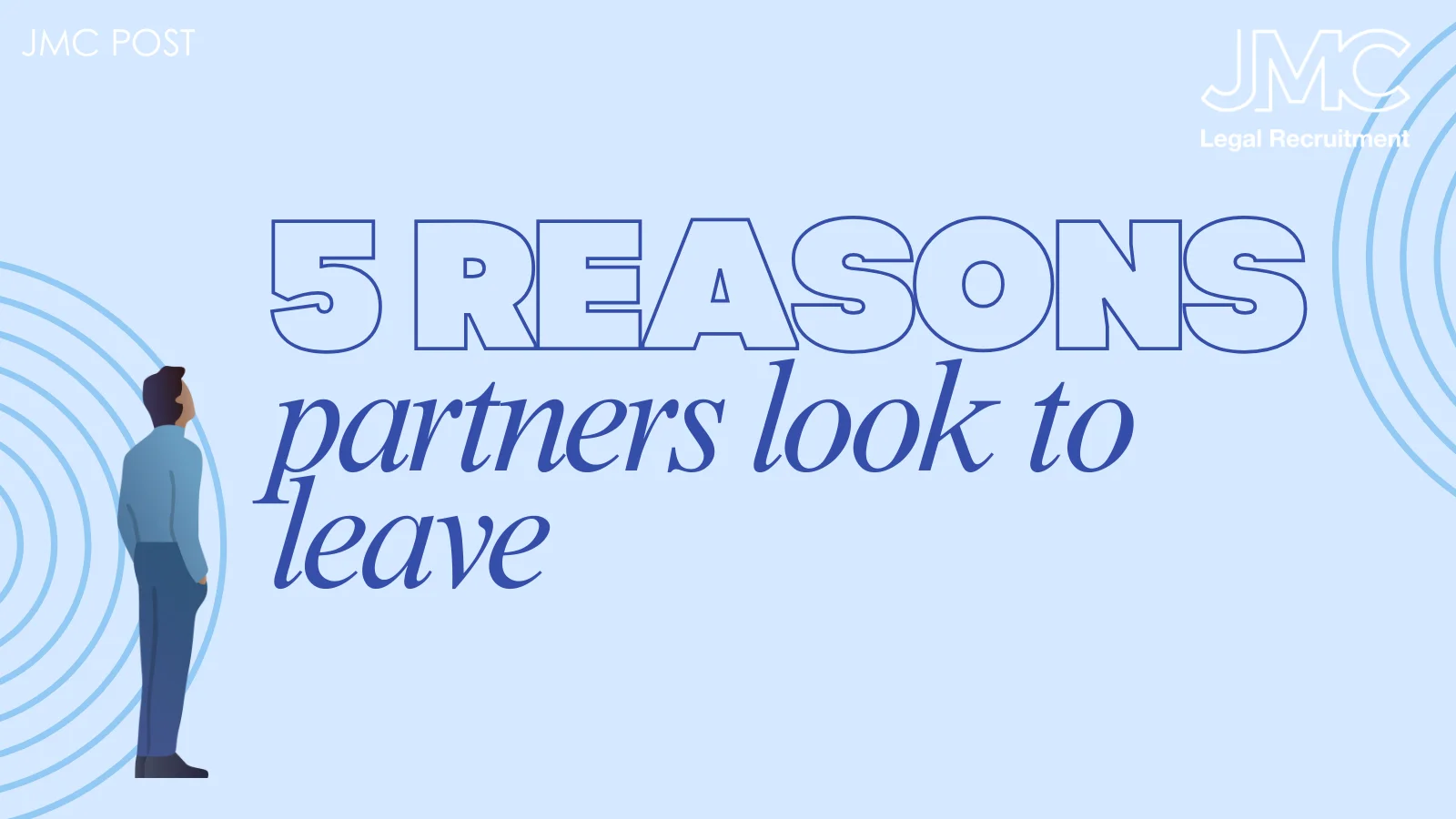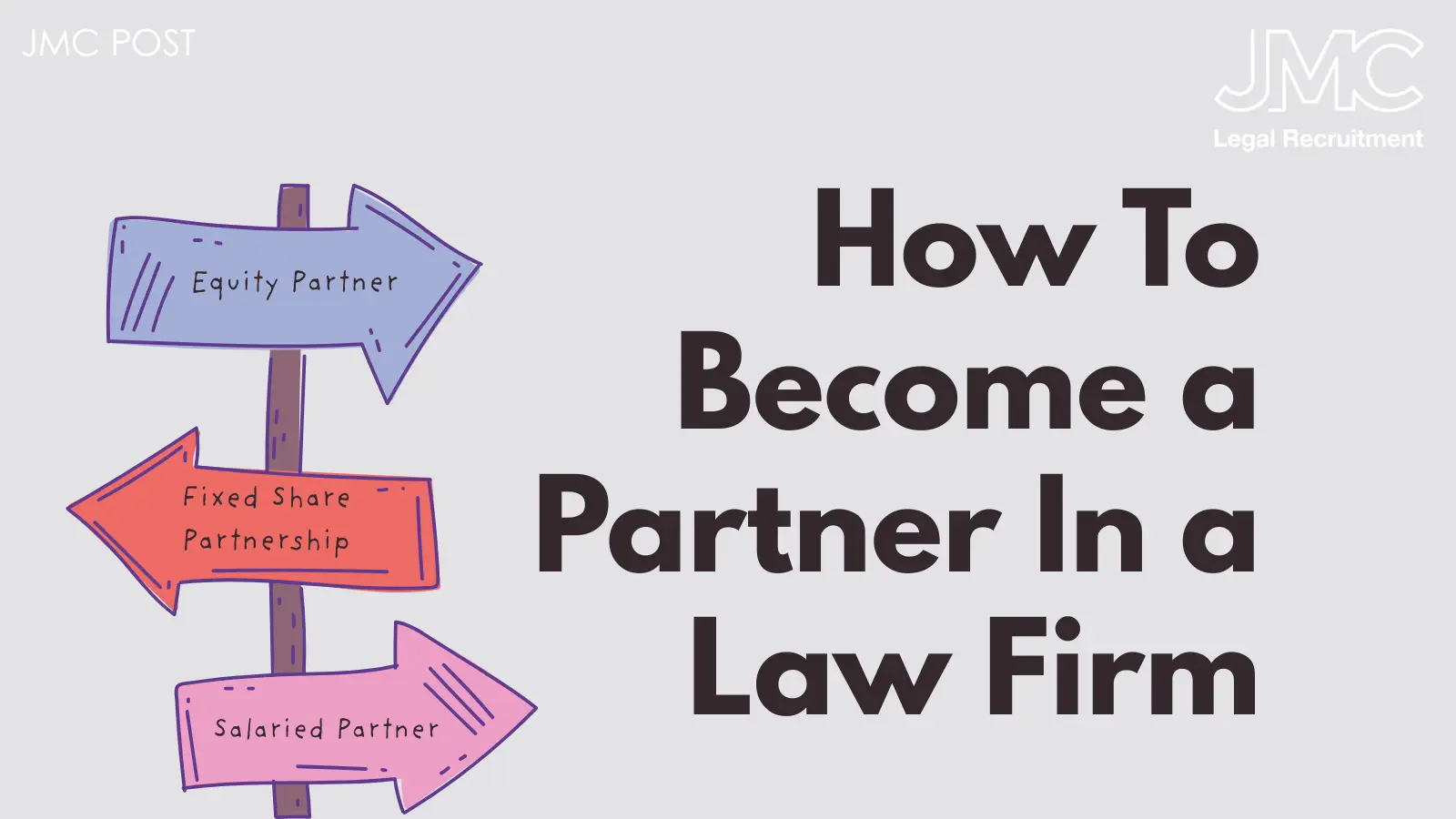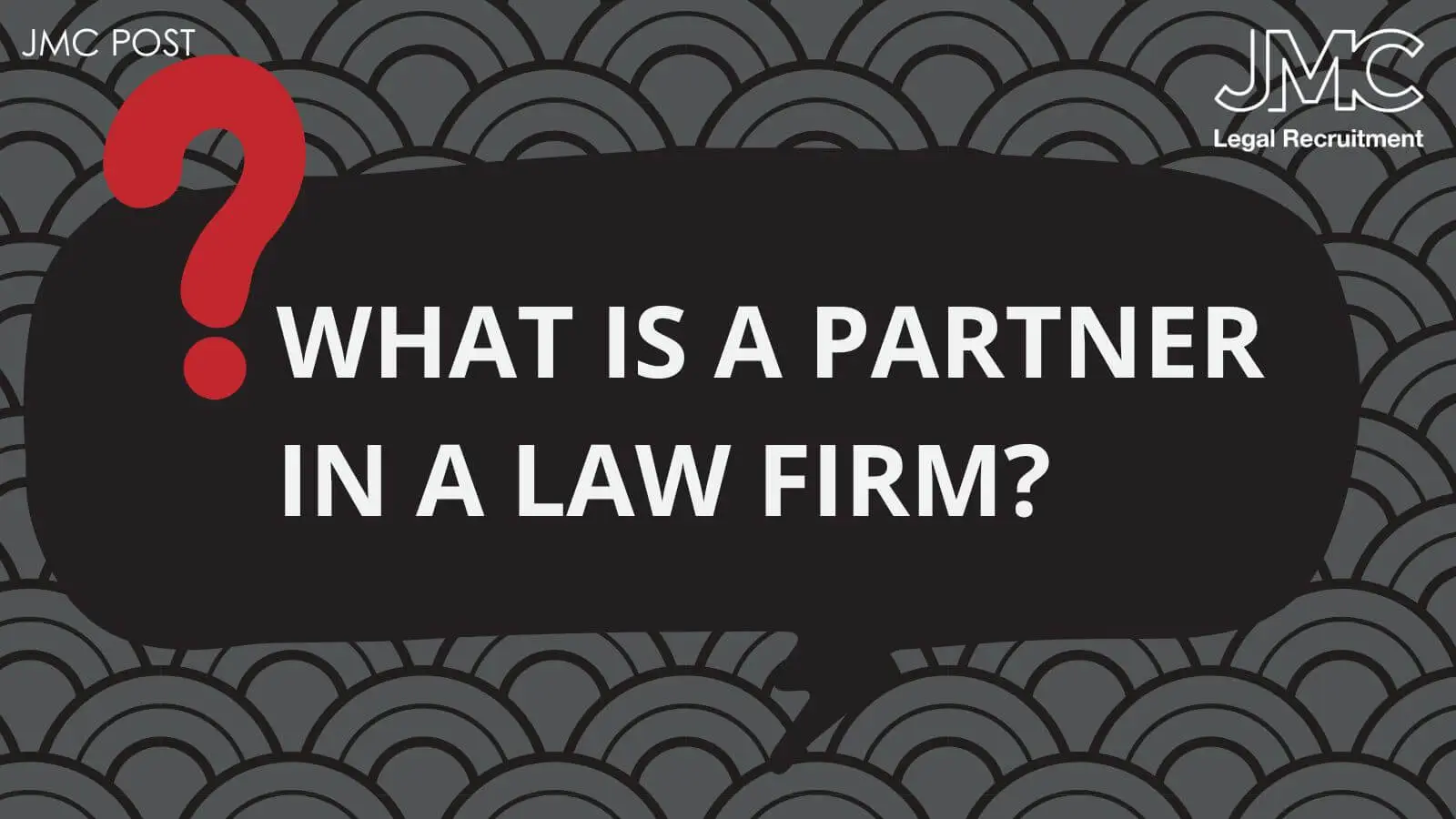
5 Reasons Partners Look to Move Law Firms
26 Nov, 20256 minutes
5 Reasons Partners Look to Move (From a Partner Recruitment Specialist)
I'm Sean Nicholson, the Managing Director at JMC Legal Recruitment, and I am a partner recruitment specialist at JMC Legal Recruitment. This means I spend most of my time talking to decision-makers, Heads of Departments, and partners in legal practices- both the ones looking to hire and, crucially, the ones looking to make a move themselves.
If you’re a firm struggling with retention, or a Head of Department trying to understand where to find the next batch of top-tier legal talent, you need to know why partners leave.
It’s simple: if you figure out the reasons someone walked out the door, you can put things in place to stop the next one from doing the same. It's about retention, succession planning, and actually having a strategy to grow around your best people.
I’m going to lay out the top five reasons I see, day in, day out, why partners are picking up the phone to us.
If you don't address these points, there’s a chance you will lose your best people.
1. Support and Platform: Stop Stifling Your Partners’ Growth
This is the foundation, and it comes in various forms. If you expect a partner to go out there, win huge mandates, and grow the department, you have to give them the tools to do it. If you don't, you are actively holding them back.
The Investment in Business Development (BD)
I'm talking about real, tangible investment. Is the partner given enough of a budget and resource to actually go out and develop business? You can’t just tell them to "go get the work" and give them nothing to work with. If they’re not supported in their BD efforts, they will quickly see that another firm is willing to put their money where their mouth is.
The Crucial Need for Fee Earner Support
This isn't rocket science. How can a partner be out there billing and bringing in new work if they’re drowning in their existing commitments because they have no support?
- Associates: Are there enough quality senior associates and solicitors around them?
- Paralegals/ Legal Secretaries: Do they have the necessary administrative backup?
If you don't know what support your partners need, you have failed. You need to be talking to them, understanding where they are lacking, and giving them what they need to go out and develop more business. Ultimately, more business needs to be coming through that department.
So, you look internally first, you make sure the people you have are happy, supported, and given the right platform, and only then will you naturally be able to hire more partner and associate legal talent around them.
2. Strategic Alignment: Where Are We Going? Because I'm Lost.
Partners need a clear vision. If the leadership team and the partners in the department are not on the same page, targets won't be reached, the right hires won't be made, and business will suffer.
Defining the Firm's Strategy
What is the firm’s strategy? It needs to be crystal clear.
- Is the firm prioritising commercial/corporate work or litigation?
- Is the focus on internal cross-referral work or external business development investment?
- Are you committed to investing in bringing more people through the door, or are you hoping for the best?
If your partners don’t know or don’t agree with the strategy, they become disillusioned.
If your strategy doesn't align with their ambitions, they will start looking elsewhere for a place that does. I see it all the time. The smart ones realise that if the firm is paddling one way and they are paddling the other, they’re going to hit a wall. They're not going to stick around for that.
3. Recognition: Stop Treating Your Lawyers Like Cogs in a Machine
I feel strongly about this one. For years in the legal world, the attitude has been: “You’re paid well, just get on with it.” Bring the work through the door, train the associates, do the job you’re expected to do. That’s an outdated mindset, and it will cost you good people.
Beyond the Paycheque
Recognition is huge in this day and age. It's harder out there than it was 30 or 40 years ago. There is more competition, more firms, and more senior individuals in similar capacities.
If a partner or senior associate wins a huge mandate, or brings in huge amounts of work, even good quality work, it needs to be recognised.
- Monetary Recognition: Yes, it can be monetary. Hopefully, you have a solid bonus structure in place. But if you don't, it’s time to think about changing that. A weak bonus structure is a sign you don't value the work.
- Non-Monetary Recognition: It could just be a nice, genuine “well done.” Giving them something, a small present, or just acknowledging the hard work this individual has done for years.
Especially with hybrid working, people need to feel like they are still part of the team, that they are heard, listened to, and seen. Recognition is a massive part of that. Don't underestimate how much a valued partner will talk to me because they haven't been thanked for landing a career-defining piece of work.
4. Progression and Money: Is it reflective of the work?
I guess this is the big one, the one that ties everything together. Money is important, of course. People want to be looked after and remunerated fairly for the work they’re doing. But it’s also about giving them a real reason to invest in the firm, build more work, and work harder.
The Money Problem
I speak to individuals who joined a firm on 'X' amount five, six, seven years ago, and that has barely increased. Meanwhile, their billings are three, four, four and a half times their basic salary, and their bonus structures are poor to say the least.
Firms in that boat are losing good partner level legal talent. And then how do you hire? How do you market that role to a candidate from a competitor firm in a competitive market like london legal recruitment when the money, the bonus, and the benefits aren’t good enough?
It's difficult for you and near impossible for me. You’re asking me to sell a role that you’ve already devalued.
The Progression Problem (Salaried to Equity)
Progression also comes in different forms:
- Up the Ranks: Moving from salaried partner to fixed-share partner to equity partner.
- Leadership: Progressing from partner to Head of Department.
It needs to be clear. There must be set structures, and individuals need to have a clear idea of how and when they can progress.
The Equity Trap: No More "Face Fit"
When it comes to equity, the structure needs to be crystal clear. We can’t have a face-fit equity structure in 2025. It just doesn’t work. You will lose talent. If a partner sees they are never going to get the equity progression they want, they will leave. Believe me, if they’re good enough, someone else will provide it.
Furthermore, if you are offering someone equity, they need a reason to invest that money. If you’re asking them to buy in a third of what they’re likely to earn in year one, which could be hundreds of thousands of pounds, they need to believe in the firm. If they see:
- Poor profits.
- No good talent being hired or retained.
- Massive staff turnover.
They will not buy that equity. They will go somewhere else where they either will invest, or they’ll go to a firm that just pays them more from the outset, offers less commitment, less stress, and the progression reward they are actually looking for.
This is a non-negotiable point for partner recruitment specialists when working with senior level legal talent.
5. A Destructive Shift in Culture: Why the Good Times Ended
You see mergers and acquisitions happening almost weekly. This causes a huge internal shift in culture. Of course, the firm being acquired will tell everyone it’s going to be great, but a lot of people will see through it. If you can’t hold on to your key people, things will fall apart.
The Merger Fallout
I’ve seen ten, fifteen, thirty people leave in the space of a few months after a merger because of a huge cultural shift. It happens.
The Slow Culture Drain
This doesn’t just apply to M&A. It applies to solicitors who have been at firms for long periods. Things change. Mindsets change. The leadership team they joined six years ago could have a completely different view now. The firm could have been exciting to work for, but now there are internal politics, people aren’t happy, and the culture is holding them back.
If the culture isn’t good, people will leave. There’s no two ways about it.
- The Ticking Clock: If you’re a partner hoping the culture will shift back to the "glory days" of 15 years ago, and it doesn't change, the clock is ticking. You will leave.
- The Domino Effect: This is the scary bit for firms. That person leaving could be someone with huge connections and a massive client base. They could take huge amounts of work with them. I've seen it countless times: one partner jumps, and then five, six, seven more follow. Suddenly, a firm with 20 partners has lost half its partnership.
How do you replace that? Your profit per equity partner is down. Your income is down. You have no money to hire. You’ve gone from a good spot to a terrible one.
The Bottom Line for Partner Level Legal Recruitment and Retention
All of this can be avoided. I firmly believe that. If you, as a firm, implement the right strategy, look after your people, provide them with a clear path for progression, give them the platform, the investment, and the recognition, there is genuinely no reason they should be wanting to leave.
The points above aren't suggestions; they are the critical retention failures that put a clock on your firm. You can't delegate culture, and you can't assume money solves everything if the platform is broken.
- For Firms: If you're losing high-quality senior associate and partner talent, stop looking externally for replacements until you've fixed the internal structure. The cost of replacing a departing partner, the lost clients and disruption, vastly outweigh the cost of fixing these five issues.
- For Decision-Makers: These insights aren't just about retention; they are about succession planning. You need to be actively cultivating and rewarding your senior level legal talent now to ensure a pipeline of future partners who actually want to commit to the firm's equity.
If you address the issues of support, strategic alignment, genuine recognition, fair progression, and a positive culture, you will retain your best people.
If you ignore them, believe me, your best talent will be talking to me soon.
Further Reading:
The Real Reason Later Partner Moves Succeed or Fail
The Partner Talent Funnel: Are We Really Losing Top Legal Talent to In House Legal Vacancies?
How to Read In House Legal Jobs Spec



